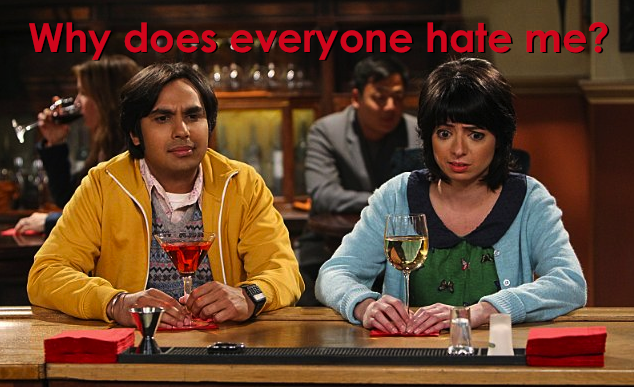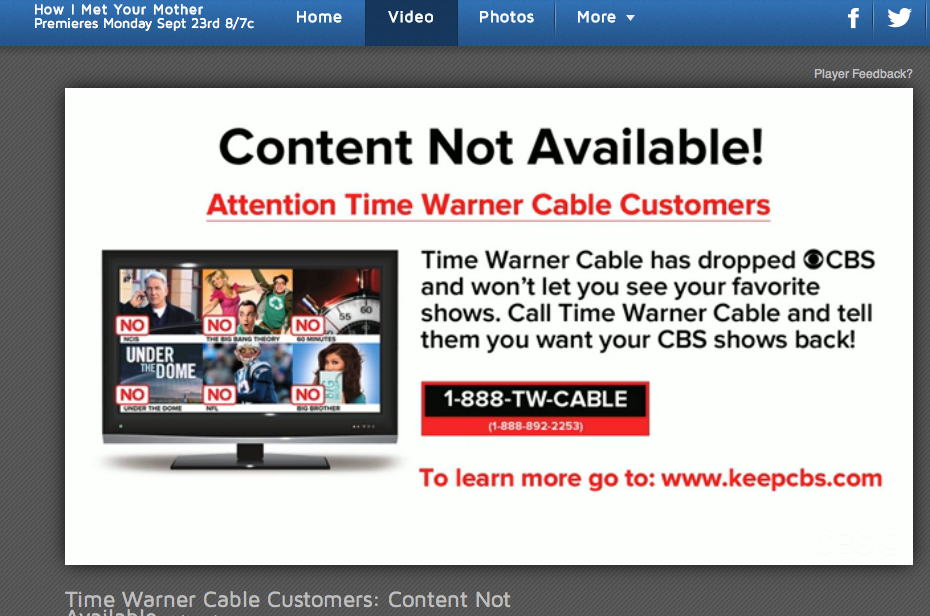Don’t Be Fooled: Both Time Warner Cable & CBS Hate Your Guts
 Since Friday afternoon, Time Warner Cable customers in New York, L.A., Dallas, and other markets have had to go without CBS, while all TWC subscribers are having to ask their friends what happened on Dexter last night because that premium network is blacked out nationwide. Meanwhile, both sides of the fight are attempting to win over public sentiment. But don’t be fooled — they both hate consumers very, very much.
Since Friday afternoon, Time Warner Cable customers in New York, L.A., Dallas, and other markets have had to go without CBS, while all TWC subscribers are having to ask their friends what happened on Dexter last night because that premium network is blacked out nationwide. Meanwhile, both sides of the fight are attempting to win over public sentiment. But don’t be fooled — they both hate consumers very, very much.
PAWN-OGRAPHY
Nothing about these carriage fee fights — in which the cable company always claims it is being bullied into paying some mammoth increase to broadcasters for the rights to retransmit the networks, while the broadcaster makes a specious allegation that it has been basically giving its programming away to the cable company since the last contract — have anything to do with providing better programming or service to the consumer. Until recently, when both sides realized they could try to leverage public sentiment against each other, these sorts of disputes were handled far from public view.
But these days, a carriage fee dispute results in full-page ads being taken out in local newspapers, with Time Warner Cable saying it is getting raked over the coals by the evil corporate overlords at CBS. Meanwhile, CBS’s plea to the public is to remind them that they are missing shows like Big Bang Theory, Big Brother, Under the Dome, and others.
It’s the same as when parents use children as pawns in a fight that has nothing to do with the kids. And when parents do that, it demonstrates how little they care for their children.
TIME WARNER CABLE JUST WANTS YOU TO PAY MORE
All of this chest-beating, war-crying, blackout brinksmanship nonsense by Time Warner Cable is mummery. Sure, TWC has every intention of getting the best deal it can on the carriage fees it pays to CBS, but it ultimately doesn’t care all that much — because it will pass on that extra cost to subscribers.
While anyone can cancel their cable service, the fact is that most people won’t, because they like their shows. Many of the most watched and talked-about shows these days are on basic or premium cable channels, and it would take a substantial rate hike to drive subscribers away in meaningful numbers.
And of course, most TWC customers — like subscribers to almost all cable providers — have virtually no choice when it comes to getting their cable TV. Companies like TWC, Comcast, Charter, Cox, Cablevision, and others, generally have localized monopolies. You live at a certain address, you then get cable from a certain provider.
AT&T U-Verse and Verizon FiOS offer competition in a few areas, but neither company seems heavily invested in actually competing nationally. In fact, Verizon recently made a deal with several major cable subscribers to market its wireless products in bundles with those providers’ cable services. So why would Verizon continue speculatively building out its expensive, labor-intensive FiOS network and hoping customers sign up when it can use existing cable subscribers to expand its already market-leading wireless network?
And of course there is satellite from Dish or DirecTV. These are both viable alternatives for people who only want to replace the cable TV portion of their service, as neither of the major satellite providers has been able to provide a comparable satellite-based Internet service. Given that consumers are receiving more and more of their content through the Web, this Internet-access divide between terrestrial cable and satellite TV could prove to be crucial in the years to come, and for right now, it’s one reason why some customers are staying put.
Beyond that, remember that none of these alternatives are above starting carriage fee disputes of their own. So switching from TWC to DirecTV is really just more of the same nonsense.
CBS WANTS THAT MONEY TOO, BUT IT WILL NEVER ASK FOR IT
I’m very amused by the tactic used by broadcasters in these situations. They trot out their beloved shows — Don’t you miss Dexter? Why is TWC making you miss Sherlock? College football season is starting soon! — and make a frowny face as if to say, “These could all be yours again if you just tell big, bad Time Warner Cable to be nice to us.”
And it works to some degree, because none of us pay bills to CBS. No one has ever had to wait in line at a CBS office to dispute some mysterious charge, or been put on hold for an hour and then disconnected because someone at a CBS call center on the other side of the world forgot about the call.
Consumers have a built-in hatred of cable companies, made worse by the aforementioned limited options in the marketplace. So the natural tendency for many people is to direct that ire at Time Warner Cable, calling the company greedy and evil… which it is, but so is CBS.
Even though its shows are freely available over-the-air and online, CBS believes that Time Warner Cable should have to pay more. And while, in spite of what some of the network’s programming might indicate, the people at CBS aren’t complete morons. They know that TWC isn’t just going to eat those increased carriage fees and tell investors, “Sorry. Hope you didn’t want your share price to go up.”
No, CBS is fully aware that any substantial increase it gets TWC to agree to will ultimately be covered by increased rates to TWC subscribers — or by hikes to existing fees, like those charged for renting cable modems.
And so please don’t be fooled by CBS’s rolling out the dessert cart of shows you can’t watch right now. If it really wanted to make that programming available to customers, it would not have blocked Time Warner Cable customers from having access to shows on CBS.com.
Unlike services like HBO Go or the recently launched ABC live-streaming app, which require that customers verify they are paying cable customers before being granted access, CBS.com is intended for anyone to have access to the network’s shows, free of charge. One need not have cable to watch these shows online, just Internet access. These online broadcasts are supposed to be supported by the obnoxious, repetitive ads that run during commercial breaks. Furthermore, CBS.com access is not an add-on to your cable bill, nor has it ever been part of the carriage fee discussion.
Thus, CBS’s decision to forbid Time Warner Cable customers — all TWC customers, including those who only get their Web access from the company — in affected markets from accessing their shows online is an attempt by the network to starve its viewership into rising up against the cable company and demanding a resolution.
But by fighting for a speedy end to this debacle, consumers are only guaranteeing that their cable bills increase that much sooner.

If CBS actually liked you, it wouldn’t be blocking access to CBS.com — a totally free service that is completely unrelated to your cable bill — for TWC subscribers.
Want more consumer news? Visit our parent organization, Consumer Reports, for the latest on scams, recalls, and other consumer issues.

